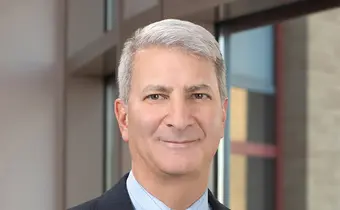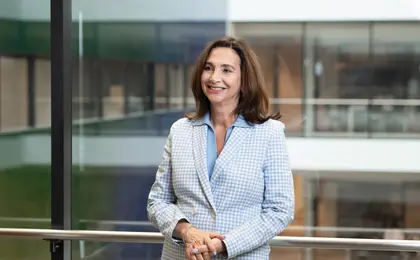
Dr. Michael Apkon ’02
MBA
CEO, The Tufts Medical Center and the Floating Hospital for Children
“I think the mission of every healthcare organization is to help people thrive,” says Dr. Michael Apkon ’02, the CEO of the Tufts Medical Center and The Floating Hospital for Children in Boston. “Our measure of success is the impact that we have on peoples’ lives. Starting with that proposition puts meaning into the work.”
That drive to deliver great impact has been the constant throughout Apkon’s career in healthcare, as a pediatric ICU doctor; medical researcher; quality, safety, and efficiency expert; startup advisor; and hospital administrator.
It is also what brought him to his latest role, leading the Tufts Medical Center, a 415-bed facility with a $1 billion budget and 6,000 employees, scientists, medical staff, volunteers, and students. It is the principal teaching hospital of Tufts University School of Medicine, which was a particular draw for Apkon. “Academic medical centers are able to amplify their impact through scholarship, research, and education,” he says. “By reflecting on the care of tens of thousands, we’re able to transform the lives of tens of millions.”
Apkon began his career by focusing on one patient at a time. After earning an MD/PhD at Washington University School of Medicine in St. Louis, he began his residency at the Yale New Haven Hospital in 1989. “When I started my career, I was a clinician working at patients’ bedsides in the pediatric intensive care unit.” But even then, he says, his work with patients led him to problems that were important for science to solve with his ongoing research. “I also tried to extend my clinical work through research that would change the way we practice.”
Early on, Apkon also got involved with quality improvement projects. “I liked the teamwork and building new systems to deliver safer and more effective care,” he remembers; it was a way to make durable and significant change. “I realized with the quality improvement work I could affect not only the few hundred children that I cared for directly, but also the care of every child that moved through that ICU.”
Those projects sparked sustained fascination with system improvement. “I wanted to do that work over larger spans of clinical operations, to lead more complex teams and more complex organizations,” Apkon says. “I knew there were gaps in my education around financial acumen, managing change, and organizational behavior, which would be increasingly important as I expanded my sphere of influence. I made the decision to further my education at Yale SOM.”
Apkon’s business school experience “might have been unique,” he says. He joined the Yale MBA program in 2000, alongside the first class of joint-degree students simultaneously studying for an MD and an MBA, but he remained a full-time member of the Yale School of Medicine faculty. (Yale SOM’s MBA for Executives program, which is designed for working professionals, including healthcare practitioners, didn’t exist at the time.) “I went from the classroom in the morning to my job as assistant medical director for the intensive care unit in the afternoon.”
Apkon appreciated his very experiential path through the curriculum, sometimes using what he had learned in class to solve a problem as soon as he got to the office. “I’d come back to class the next day with new problems to discuss,” he says. “The ability to apply what I was learning really helped me get a lot out of the experience.”
The tools he learned at Yale SOM remain a part of his work, he adds. “Nearly 20 years later, I’m channeling one professor or another one, one part of my SOM education or another, on a near daily basis.”
Since receiving his MBA, Apkon has led a series of large healthcare organizations. After serving as the vice president of the Yale New Haven Children’s Hospital from 2006 until 2010, Apkon became the senior vice president for medical affairs and chief medical officer for the Children’s Hospital of Philadelphia.
From there an opportunity opened up in Toronto. “I had the privilege of working in Canada for five years as a chief executive for the Hospital for Sick Children.” A teaching hospital affiliated with the University of Toronto, it is considered Canada’s top children’s hospital. Apkon was named the top-rated CEO of a large organization in all of Canada, having earned the approval of 99% of the hospital’s employees in 2017.
“The perspective I have as a physician, together with what I learned at Yale SOM, has allowed me to have an impact across several organizations,” Apkon says. “And because those organizations have worked internationally to help healthcare systems in other countries expand their capability, there’s a ripple effect that I’m proud to see is quite substantial.”
He has also collaborated and consulted with organizations and governments in the UK, Europe, China, Africa, and the Middle East, and advised startups. “I’ve enjoyed over the last few years getting involved in helping new companies bring good ideas from bench to bedside,” he says. “I’ve worked with several new ventures in the medical device and therapeutic space, helping them understand the healthcare industry and where the need is. It’s a different way to deliver value and have an impact on people’s lives.”
In 2018, Apkon returned to the U.S. to lead Tufts Medical Center. The contrast in the countries’ healthcare systems offered him an opportunity to reflect. “Canada is a country that spends about half of what the U.S. does, with life expectancy that’s several years longer,” he points out. “Today in the U.S. we’re spending nearly 20% of the GDP taking care of people, and yet many of the outcomes that we deliver are not as good as in many other countries.”
The solution, he says, comes back to better systems. “We’re trying to figure out how to address the high cost of care, and how to deliver better outcomes by transitioning from an episodic approach to care delivery as a continuous process.”
Apkon has moved through many corners of the vast, complex healthcare industry. Yet, his view is very pragmatic and patient-centered. “The thing that society is really looking to the healthcare industry to do is achieve greater efficiency, better outcomes, and better experiences for people,” he says.
His perspective as the CEO is different from what it was when he was an early career clinician. “I’ve come to appreciate how important all of the interconnected functions—human resources, supply chain, risk management, information technology—are to delivering exceptional bedside care,” he says. “These days, I spend my time thinking about how to set an overarching direction that helps align and direct the energy of the people within the organization.” Even so, his focus in on the ultimate mission—keeping people healthy. “I see management as a means to an end—the end being better care for the patients.”
Apkon the administrator relies on Apkon the doctor as a touchstone. “I’ve found it enormously valuable to remain clinically active,” he says. “It enhances my credibility with the clinical staff; it also gives me deeper insight into how to make the systems of care better for caregivers and for patients.”
Knowing that many administrators don’t have direct interactions with patients, Apkon found a surrogate, he says. “I’ve introduced mission reminders in our management meetings. We bring in a story or a letter from a patient or family to remind us, as executives, why we’re here every day and the impact that we have on peoples’ lives.”
Keeping an eye on the individual patient helps make it possible to make successful systemic change, he says. “If we can understand the healthcare experience through the eyes of the patients and their families, then knowing how to drive organizational improvement becomes much easier.”



